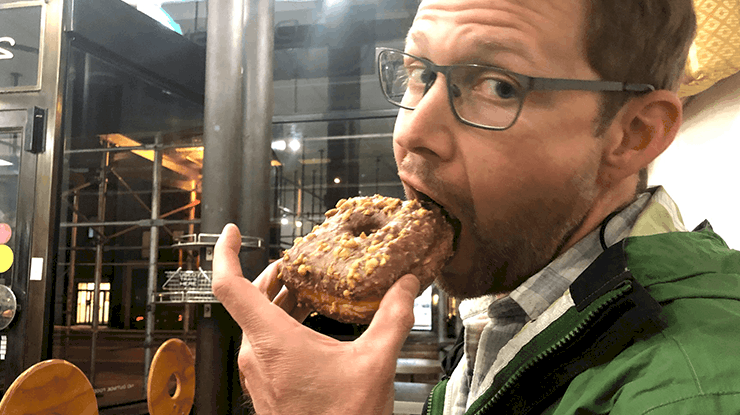With eating and nutrition, it’s easy to feel you’re being controlled by diet rules or some external goal like a scale weight.
We’ve all had the experience of trying some sort of a diet or nutrition program where it felt cool and exciting in the beginning… and then slowly become controlling. Pretty soon, we hate the rules. The next thing we know, we totally rebel and eat all the things.
It always sounds appealing at first, to have food controlled by diet rules. It seems like a simple and straightforward path to our fitness goals, and whatever we expect those goals to give us: Health, happiness, and the pursuit of… looking hot? Or whatever they are selling us.
The thing is — no diet rules fit into our complex lives with multiple things that matter to us. They might help us hit our goals in one situation but keep us from things that we care about in another situation.
👉 If you’re in a hurry, skip to the assessment
What Autonomy in Eating Looks Like
Eating autonomy is the ability to make decisions based on what matters to you in a situation.
autonomy – /ɔːˈtɒnəmi/ n., the ability to act and make decisions without being controlled by anyone else
Let’s say you’re out at a restaurant eating with friends. Your choices might be limited.
You have the skills to not eat the thing when it doesn’t matter.
On the flip-side, when it does matter, you can eat the things without guilt or without falling “off the wagon.”
 Here are some examples:
Here are some examples:
- Skipping the chocolate bar that they want because they’re procrastinating a work project
- Having the chocolate cake on their best friend’s birthday
Or…
- Skipping the chocolate chip cookie that they only want because they walked by the break room
- Having the chocolate chip cookie that their kids made
Or…
- Not having the beer or wine that they only want because they’re stressed out after work
- Having the wine on date night
Or…
- Not eating ice cream because they’re bored at night
- Eating ice cream at their favorite ice cream shop on a beautiful summer day
If eating the cookies to numb out stress doesn’t fit what matters to you, and eating the chocolate chip cookies your kids made does matter to you, then it’s not about the cookies. It’s not about some foods being good and some foods being bad. It’s about some choices being mindless and others being mindful.
 Diet rules never allow for this kind of situational decision making. They never allow for eating the thing unless it’s a “free day” or some other complete ridiculousness.
Diet rules never allow for this kind of situational decision making. They never allow for eating the thing unless it’s a “free day” or some other complete ridiculousness.
Don’t even get me started on how diet restriction to free-days teach people to ping pong from “you can’t have it” to “you must have it now is your only chance.” That’s not autonomy either.
Diets allow for no autonomy, whether in restriction or “free days.”
On the flip-side, most people don’t have the skills to not have the thing when they’re bored, tired, stressed out, or emotional. It requires skill practice to be able to discern when to eat the thing and when not to, and then to have the skills to not eat it.
This kind of ability to make different decision in different situations is awesome. This is what makes eating both fit into your life and fit your goals.
Eating Autonomy Requires Two things
- Knowing your personal values around eating
- Having the skills to eat in line with your personal values around eating
Your values give you the compass so you can make decisions. If your values include things like being “wise” and “connected,” it makes the above decisions really easy to make.
- Skipping the chocolate bar that they want because they’re procrastinating a work project
- Having the chocolate cake on their best friend’s birthday
Of course eating to procrastinate a work project is not wise and it isn’t connected. On the flipside, having the birthday cake at your best friend’s birthday is wise and connected.
People often complicate values work, but in GMB Eating Skills, we keep it that simple. Anyone can look at the above situation and figure out what the values based eating choice is in each situation.
It’s simple, it’s clear, and it makes it possible for you to know what the autonomous eating choice is in every situation.
The second thing you need to have, is the combination of eating skills required to not eat the thing when you’re just procrastinating.
Autonomy vs Scale Weight
Normally people measure their success with eating with their scale weight… because that’s the only way that they’ve ever been taught to measure it.
We’ve always been told that changing our scale weight will change our level of happiness and confidence. Some fitness influencers act like a certain scale weight or level of leanness is key to a life of continuous bliss.
It doesn’t quite work like that.
Before I had clients do values work, most of the clients who hit their goals were pretty disappointed. I made a whole career of getting clients to their goal scale weight, only to find that most of them were only happy about it for two weeks. Then, when it didn’t solve the existential crisis of human existence, they were crushed.
They were still about just as happy and confident as they were before they lost weight. The only thing that losing weight solved was weight.
Many of us have looked at pictures of ourselves in different times of our lives, and have seen that we’ve had all different scale weights. Sometimes it was more, sometimes it was less. Usually, our level of contentment with our lives had less to do with that, and more to do with the way we were living our lives at the time — if we were doing the things that mattered to us, with the people who mattered to us. Said another way, we were living in line with our values.
If you want to change your scale weight, that’s cool. You can totally do that. Folks who want to do that, often find that that just shows up when they level up their eating skills and eating autonomy.
But the folks who lose weight and end up with less eating autonomy are often pretty miserable. If you have to white knuckle diet rules for the rest of your life, and miss out on food and connecting with people because of it, that sucks.
Remember, eating autonomy requires two things: Knowing your values around eating and having the eating skills to eat in line with your values.

Assess Your Eating Autonomy in Four Steps
Four things to assess:
- Meals
- Between meals (snacks)
- Stress resilience
- Different eating decisions in different situations
Meals:
Can you eat a satisfying meal and stop?
For a meal that’s well-balanced, that means that you can notice you’re getting full while you’re eating, and stop at the right place, where you’re satisfied until the next meal.
For something like pizza or cookies, that means being able to figure out how much you want to eat, eat that, and stop.
Rate yourself on a scale from 1-5.
Between meals:
Can you distinguish hunger from stress?
Different forms of stress (emotions, cravings, tiredness, boredom, distressing thoughts, just seeing something delicious) can feel like hunger. The question here is: Are you are able to — in the moment — distinguish hunger from stress?
That when you snack, is it because you are truly hungry? Or are you snacking to avoid feeling some kind of stress?
Can you mindfully choose to eat something just because it’s delicious, special, or because you really want it? Can you make those mindful choices for delicious things and not feel guilty about them?
Rate yourself on a scale from 1-5.
Stress resilience:
Can you feel those things (emotions, cravings, tiredness, boredom, distressing thoughts, just seeing something delicious) without having to eat to avoid them?
Do you feel like your emotions are normal and ok?
Do you have some basic tools to be with all of the normal ups and downs of human existence? Or is food an all-to-often go-to?
Rate yourself on a scale from 1-5.
Different eating decisions in different situations
 Can you make different eating decisions in different situations (without feeling guilty)?
Can you make different eating decisions in different situations (without feeling guilty)?
Diet world has often taught us that there should be one set of rules we must obey in all situations. People feel guilty and bad if they have cake at their mom’s birthday. They feel bad for having too much food at Thanksgiving. They feel like they’re “off the wagon” if they have pizza at their kid’s pizza party.
Are you able to make these kinds of decisions, without feeling guilty, feeling like you are off track, or having to designated it a “free meal?”
At the same time, can you skip the muffin on a random Tuesday that you just want because you are bored? Or can you not get seconds just because it looked tasty? Can you notice and skip the things that are neither hunger-related nor really matter to you?
Or, on the other hand, are you able to confidently make different decisions in different situations, and see how each one fits your values?
Rate yourself on a scale from 1-5.
Now You Have an Assessment for your Eating Skills
The four areas above give you a really clear, broad strokes overview of your level of autonomy with eating.
You can look at your assessment to see what you might need to work most on: Meals, between meals, stress resilience, or making different decisions in different situations.
You might find that you’re doing on meals, but need to work on stress resilience. Or you may find that you’re doing great on meals and between meals, but need to work on making different decisions in different situations. You get a really clear picture of what you already have working, and what you most need to work on for more autonomy.
Whatever nutrition program or philosophy or skill-set you are using, you can use this assessment to check in on. If it’s moving your score higher over time, it’s increasing your eating autonomy. On the flip-side, if your score is decreasing, it’s moving you further from eating autonomy.
GMB Eating Skills BASE Assessment
We use a more comprehensive questionnaire in Eating Skills (BASE – Basic Assessment for Skills-based Eating) to assess people’s skill-level, and give them a score that takes into account individual skills and guidelines that meet the four above goals. It’s what we use to assess the program’s effectiveness, and what clients use to track progress over time.
The whole thing would be a little too much for this article, but you can try a simplified version here:
Here is an example of three clients from Eating Skills, and how they progressed in the eating autonomy, throughout the course of the program:

It isn’t a straight line. People start in different places and people hit different little bumps in the road along the way. But it gets better. The thing is, that with practice, people can increase their level eating autonomy, over time.
The people who complete the program average a 91% increase in BASE scores. It’s just a matter of practice, tracking practice, and continuing to show up.
Questions start with basic stuff like, “How often do you eat a balanced meal?” and “How often do you eat slowly?” Then go to common difficulties like “How often do changes in schedule or stress level throw off your eating?” and “How often do you eat when stressed out?” Finally, more complex and important things like “I know how to eat in social situations” and “My food choices reflect my personal values.”
They’re all just specific questions about the four areas of eating autonomy that we looked at above:
- Meals
- Between meals (snacks)
- Stress resilience
- Different eating decisions in different situations
When people get better at those four things, they’re always really stoked.
Ditch Being Controlled by Diet Rules
No one feels autonomous when they’re totally controlled by rules. But no one feels autonomous when they have a complete free-for-all either.
You need to use your personal values as your compass. You also need to have the skills to be able to eat in line with your personal values.
- Get clear about your personal values around eating.
- Practice eating skills. Track your practice.
- Regularly assess your eating autonomy level.
People often find that, even diets that had them hit their goals, made them feel less autonomous. If a diet is separating you from social events, that sucks. If free days are driving you into massively over-eating because “it’s your free day,” that also sucks. You’re being over-controlled either way.
Similarly, if you are kind of floating aimlessly food wise, and don’t have the skills to eat in a way that fits your values and goals, that doesn’t feel awesome either. With eating, autonomy requires skill development.
Now you have a completely different way to look at eating and nutrition. You can look at your level of eating autonomy, and see if the skills or eating program you’re currently doing is moving you closer or further from eating autonomy. You can look at the four different areas of eating autonomy, and see exactly where you’re doing well and where you might need to do more work.
With this eating autonomy assessment, you have a clear picture of what will make the biggest difference for you, to be more in the driver’s seat with your eating.
Create Your Own ‘Diet’ Autonomy
Eating Skills is a coaching experience that will help you build sustainable skills around how you eat, giving you a healthy, non-dogmatic approach to food.


